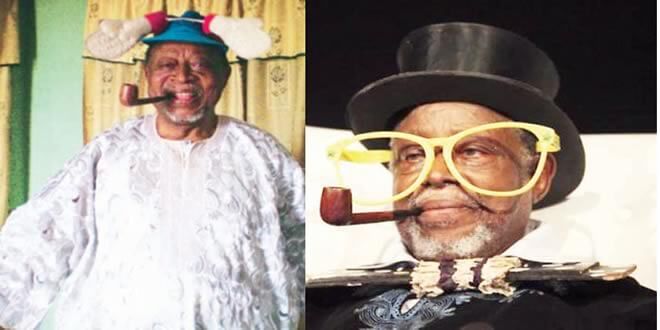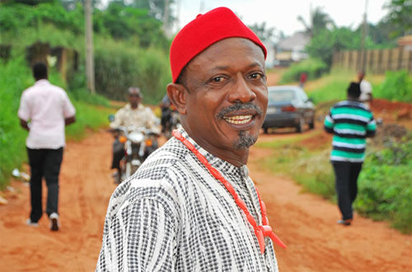On the streets of Lagos, in the hum of roadside conversations, and inside the infinite corridors of Instagram and TikTok feeds, one figure keeps reappearing. He is wide-eyed, awkward in his blue shirt, always caught in a mishap that looks painfully familiar. A nation laughs at his misfortune, memes multiply, brands rush to borrow his clumsy charm. He is everywhere at once, a phantom of humor, a shorthand for comic relief in a country perpetually balancing on the edge of chaos. His name is Sabinus.
- The Birth of a Persona
- The Digital Stage: From Meme to Movement
- Sabinus Takes Over
- The Mystery of Disappearance
- Fame, Burden, and Identity
- When the Mask Slips
- The Business of Sabinus
- Shadows of Other Comedians
- The Cultural Weight of Sabinus
- The Future: Can Emmanuel Step Out?
- Closeout: The Man in the Blue Shirt
But ask the average fan about the man behind the character — Chukwuemeka Emmanuel — and silence follows. Who is he beyond the blue shirt and exaggerated expressions? Why does he vanish the moment the skit ends? Why does his true identity blur each time Sabinus takes the stage?

The mystery is not that a comedian created a persona. Many have done so. The mystery is how, in less than a decade, the persona swallowed the man whole. What began as a playful exaggeration in Port Harcourt has now become a cultural icon so towering that even its creator struggles to stand outside its shadow.
This is the story of that disappearance — how Chukwuemeka Emmanuel, an ordinary boy from Rivers State, built Nigeria’s most recognizable comic character, only to find himself slowly erased by it.
The Birth of a Persona
Long before he was Sabinus, long before social media multiplied his face into thousands of screens, Chukwuemeka Emmanuel was just another boy navigating the restless rhythms of Port Harcourt. Born on January 30, 1995, he grew up in a city that has always carried contradictions — a place of oil wealth and endless scarcity, of laughter loud enough to drown out daily hardship.
In school, he was not the class clown in the obvious sense. His humor did not always erupt in loud performances. Instead, it lingered in the quick remark, the sly observation, the unexpected punchline. Friends noticed that he had the rare ability to transform ordinary moments into small theaters of laughter.
He later enrolled at the University of Port Harcourt to study Linguistics and Communication Studies. Uniport, like most Nigerian campuses, was its own republic of survival: cult clashes, unstable power supply, crowded lecture halls, and the everyday scramble for dignity. In that chaos, Emmanuel leaned on comedy, not as a distraction, but as a language. He studied not only words but gestures, tones, and timing. The seeds of a character were being planted, though neither he nor his classmates yet knew it.

The name “Mr Funny” first appeared casually. At the time, Instagram comedy was still finding its feet in Nigeria. Stand-up comedians like Basketmouth and AY ruled stages, but a younger generation of skitmakers was learning to turn short clips into livelihoods. Emmanuel, testing the waters, uploaded his first videos in 2015 under the name “Mr Funny.” The choice was humble, almost generic — but it was a seed waiting for sunlight.
The Digital Stage: From Meme to Movement
The mid-2010s were the golden dawn of Nigerian skit comedy. Data became slightly more affordable, Instagram was exploding in Nigeria, and everyday frustrations were suddenly raw material for short sketches. What Nollywood films took two hours to dramatize, a skitmaker could capture in sixty seconds.
Emmanuel entered this space quietly, without the polish of Lagos-based creators. He was not the sleek, urban comic with a crew and equipment. His skits were simple, often shot in natural light, with him at the center of the absurdity. Yet something about his delivery stood out.
His earliest viral sketches revolved around bad luck — situations where things went spectacularly wrong in ways audiences could instantly recognize. From borrowing money that vanished into thin air to being scammed by friends, his characters embodied a truth Nigerians lived daily: the comedy of suffering.
Then came the turning point — the birth of Sabinus.
The name was borrowed from an archetype in southeastern Nigeria, often used to describe someone gullible, clumsy, or too eager for opportunity. Emmanuel sharpened this into a full persona: Investor Sabinus. He became the man always chasing quick riches, the eternal dreamer who thinks he has found a shortcut to wealth but ends up duped, beaten, or embarrassed.
Audiences responded with a kind of recognition that surprised even him. Sabinus was not a hero; he was a mirror. He was the uncle who fell for a fake land deal, the friend who invested in a phantom oil rig, the man who always claimed to have “runs” that never materialized. His blue shirt and black trousers became uniform, signaling to viewers that another disaster was about to unfold.
By 2019, clips of Sabinus were circulating far beyond Port Harcourt. On WhatsApp groups, in Twitter memes, on Instagram Explore pages, his face appeared with captions that had little to do with the original skit but carried the universal language of misfortune.
Sabinus had transcended skit-making. He had become a cultural shorthand.
Sabinus Takes Over
There are characters in comedy who exist like masks: once the performer puts them on, the world forgets the man beneath. For Chukwuemeka Emmanuel, that mask is Sabinus.
It did not happen overnight. At first, he still appeared as “Mr Funny,” uploading clips where the name mattered more than the outfit. But by the time the blue shirt entered the frame, something irreversible began. Audiences no longer said, “Have you seen Mr Funny’s latest skit?” Instead, they said, “See what Sabinus has done again.”
It was a quiet takeover. The man’s given name slipped into the background, while the invented one marched forward with more power than expected. Emmanuel himself leaned into it, perhaps recognizing the force of the persona. He created recurring scenarios — Investor Sabinus attempting to pitch a half-baked business idea, Sabinus chasing love and failing spectacularly, Sabinus trying to keep up appearances with money he didn’t have.
The more he doubled down, the stronger the grip of the character became. By 2020, few Nigerians could picture Emmanuel without imagining him as Sabinus. In public, even when dressed casually, fans would yell, “Sabinus!” across the street. The blue shirt became as recognizable as Charlie Chaplin’s bowler hat or Rowan Atkinson’s tweed jacket.
Soon, the persona was not only a skit character but a cultural export. His memes crossed borders. In Ghana, Kenya, and even diaspora communities in Europe and America, Sabinus jokes became currency. His exaggerated facial reactions became stickers on WhatsApp, GIFs on Twitter, and punchlines in group chats.
In that moment, Emmanuel had created something larger than himself. But the irony was bitter: the more famous Sabinus became, the more invisible Chukwuemeka appeared.

The Mystery of Disappearance
Here lies the paradox. Everyone knows Sabinus. Few know Emmanuel.
Unlike some comedians who toggle freely between their stage personas and their real selves, Emmanuel rarely steps out of the mask. His interviews, limited as they are, often circle back to Sabinus. Even at award shows, audiences expect him to be Sabinus, not Emmanuel.
This is where the mystery deepens. Did Emmanuel choose to disappear, or was he erased by the demand of his own creation?
There is a psychological weight to being trapped in character. Rowan Atkinson, globally known for Mr Bean, once confessed he avoided public appearances because people could not separate him from the childlike, bumbling man on screen. Sasha Baron Cohen has spoken of how exhausting it is to be mistaken for Borat in real life.
For Emmanuel, the weight is uniquely Nigerian. Here, public figures are consumed with intensity. Once the public names you, that name becomes destiny. Sabinus, once a joke, now functions as Emmanuel’s identity card.
There are practical consequences too. On social media, millions follow “Sabinus Official,” not “Chukwuemeka Emmanuel.” Brands sign endorsement deals with Investor Sabinus, not the student of Linguistics from Uniport. Even Nollywood directors who call on him prefer to write scripts that emphasize the Sabinus archetype, not Emmanuel’s range.

What happens when the world does not allow you to be yourself anymore? That is the mystery Emmanuel lives in — a slow, almost imperceptible vanishing act, where the performer behind the mask grows faint with each laugh the mask generates.
Fame, Burden, and Identity
Fame, for comedians, is often double-edged. On one hand, it guarantees relevance, wealth, and cultural immortality. On the other, it locks the performer into an unending cycle of repetition. For Emmanuel, fame came tethered to Sabinus — and Sabinus is endlessly hungry.
Social media platforms demand constant content. The algorithm favors frequency, and audiences expect daily humor. Each skit is consumed and forgotten in hours, demanding another. For Emmanuel, this means Sabinus cannot rest. The blue shirt must keep reappearing, or risk being replaced by a fresher meme.
The burden is not only creative but personal. At events, people want to see Sabinus stumble, not Emmanuel reflect. On stage, they expect the silly walk, the wide eyes, the awkward exclamations. In a society where private life is already difficult for celebrities, Emmanuel retreats even further. His personal details — family, relationships, inner struggles — remain sealed. By choice or by force, he has built walls around his identity, letting Sabinus carry the weight of public life.
The irony is sharp. Fame gave him visibility, but not as himself. It gave him wealth, but tied to a persona. It gave him love from millions, but not always directed at the man behind the jokes.
To live as Emmanuel is to be ordinary. To live as Sabinus is to be immortal. And so, each day, Emmanuel disappears a little more into the costume that has become his second skin.
When the Mask Slips
Every once in a while, the curtain flutters, and Emmanuel peeks through.
These moments are rare — usually during formal interviews, controlled events, or when he addresses fans directly without slipping into the exaggerated voice of Sabinus. But even then, audiences seem to struggle.
There was the night of the Africa Magic Viewers’ Choice Awards (AMVCA) in 2022, when he was crowned Best Online Content Creator. Dressed in a sharp suit, standing on a grand stage, Emmanuel accepted his award as himself. His words were calm, measured, grateful. Yet the applause carried a strange echo — people were clapping not for Emmanuel, but for Sabinus. Memes immediately cropped up with captions like “Investor don collect him award”.

In rare press interviews, Emmanuel speaks of his craft with surprising seriousness. He describes comedy as “a business, a calling, and a responsibility.” But before long, journalists steer him back into character, asking him to “say something as Sabinus.” His attempt to explain himself vanishes into another round of laughter.
On social media, fans often express mock disappointment when he posts as Emmanuel — when he wears plain T-shirts, speaks in normal tone, or writes with sober reflection. “Where’s the blue shirt?” they demand. “Give us Sabinus.” It is as though the audience has built an invisible contract: Emmanuel exists only through the mask.
These glimpses remind us that there is a man underneath, a creator navigating the fragile balance between his inner self and the outward demand. But the slips are fleeting. Before long, Sabinus is back, louder than ever, drowning out Emmanuel’s softer voice.
The Business of Sabinus
To understand why Emmanuel cannot fully abandon Sabinus, one must look at the economics. Comedy is no longer just performance; it is industry.
In Nigeria, the skit economy has grown into a multimillion-naira sector. Brands no longer limit their advertisements to billboards or TV; they reach audiences by tapping into the massive followings of digital comedians. With over seven million followers on Instagram and countless fans across YouTube, TikTok, and Facebook, Sabinus is a marketer’s dream.
Emmanuel has leveraged this demand masterfully. Endorsement deals with companies in banking, telecommunications, and FMCG sectors keep rolling in. Campaigns are crafted around the Sabinus character, positioning him as the relatable face of consumer experiences — the man who tries to make a quick win but learns the hard way.
In 2022, after his AMVCA win, endorsements multiplied. By 2023, reports estimated his net worth in the hundreds of millions of naira, with brand ambassadorships forming a significant chunk. “Sabinus” became not only a stage identity but also a registered brand, with merchandise, advertising contracts, and intellectual property.
But therein lies the complication: money ties him to the character. Companies sign Sabinus, not Emmanuel. Audiences pay for Investor Sabinus skits, not for Chukwuemeka’s reflections. Nollywood directors request Sabinus-like characters in movies, ensuring that the archetype continues to dominate screens.
The business model is clear, profitable, and relentless. Yet it is also a trap. To stop being Sabinus would mean risking the very engine that powers his career. Emmanuel is both the master and the prisoner of the creation that feeds him.
Shadows of Other Comedians
Emmanuel’s dilemma is not unique. Comedy history, both Nigerian and global, is littered with performers swallowed by their characters.

In Nigeria, the late Moses Olaiya Adejumo, famously known as Baba Sala, created an alter ego so strong that his real name faded from public memory. His comically exaggerated mannerisms made him a household staple in the 1970s and 1980s, but few outside his hometown thought of him as Moses.

Similarly, Nkem Owoh, widely recognized as Osuofia, still carries that film role wherever he goes. Two decades after Osuofia in London, many Nigerians address him only by the character’s name, as if his entire filmography before and after has been erased.

Globally, Rowan Atkinson experienced the same fate with Mr Bean. Despite his sharp intellect and ability to create layered comedy, the world sees him through the narrow lens of a childlike, bumbling man in a tweed suit. Sasha Baron Cohen, the British comic genius, struggles with the same. Borat was meant to be satire, but audiences demanded it endlessly, to the point where Cohen had to retreat from live appearances.
Even American filmmaker Tyler Perry wrestled with Madea — the loud, gun-wielding grandmother he created. Perry admitted that though Madea made him wealthy, she also pigeonholed his artistry.
Emmanuel now walks this path. The cultural weight of Sabinus is so immense that like Baba Sala, Osuofia, and Mr Bean, he risks being remembered not as a multifaceted creator but as a single exaggerated character.
This is the shadow of the comedian’s curse: when the mask becomes so beloved, the man inside disappears.
The Cultural Weight of Sabinus
Nigeria has always found ways to laugh at its burdens. From political turmoil to economic hardship, comedy becomes a survival tool, a balm for collective anxiety. In this tradition, Sabinus is not merely a clown; he is an emblem of Nigerian resilience.
His misfortunes speak to a country where ambition often collides with reality. The dream of quick success — a business deal, a political promise, a jackpot investment — is as familiar to Nigerians as the disappointment that usually follows. In Sabinus, people see themselves: always hopeful, often unlucky, never entirely defeated.
The blue shirt is now a cultural shorthand. In conversations, people say, “You don do Sabinus move” when someone makes a poor decision. His exaggerated facial expressions are memes used to react to everything from failed government policies to heartbreaks in love. In offices, markets, and even sermons, references to Sabinus slip into daily language.
This cultural ubiquity makes him larger than comedy. He is commentary. He is satire. He is a mirror held up to Nigeria’s hustle culture, where survival often demands optimism despite endless setbacks.
Yet, within this celebration lies the tragedy. The more Sabinus becomes a cultural symbol, the less Emmanuel is recognized as an individual artist. A persona meant to reflect society has instead consumed its creator.
The Future: Can Emmanuel Step Out?
Every comedian who builds a character this powerful eventually faces a choice: remain trapped in the costume or risk reinvention. For Emmanuel, that decision looms larger with each passing year.
Some paths are clear. He could transition into Nollywood, bringing new characters to life. His comic timing, honed in short skits, could expand into full-length films. He could pivot into directing or producing, using his sharp instincts to shape other talents. Or he could choose to strip away Sabinus entirely, stepping forward as himself.
But the risk is enormous. Audiences may resist. Brands may hesitate. The very algorithms that helped elevate him may turn cold if the character disappears. Nigerian entertainment history shows how hard reinvention can be. Few have successfully escaped the grip of their most iconic roles.
And yet, the future does not have to be a trap. Emmanuel is still young, with time and creativity on his side. If he can gradually shift narratives — allowing more of Emmanuel to emerge while preserving Sabinus as a beloved figure — he might achieve the balance that many before him could not.
The question is whether audiences will allow it. Can Nigerians laugh at Emmanuel, not just at Sabinus? Will they embrace the man after years of worshiping the mask? Or will they insist that the blue shirt never comes off?
The future of his career, and his personal identity, depends on how he answers these questions.
Closeout: The Man in the Blue Shirt
The paradox of Chukwuemeka Emmanuel is that he is both everywhere and nowhere. His creation — Sabinus — dominates screens, conversations, and culture. Yet the man behind the wide eyes and clumsy charm fades into obscurity each time the character takes a bow.

Perhaps that is the mystery of Mr Funny. The disappearance is not sudden but gradual, like ink bleeding into paper until the words are unreadable. Each laugh at Sabinus erases a little more of Emmanuel. Each endorsement signed in the name of Investor Sabinus distances him further from the boy who once cracked jokes in Port Harcourt classrooms.
And yet, hidden in this disappearance is also a strange kind of immortality. Emmanuel may fade, but Sabinus will linger, living in memes, quotes, and collective memory. Like Chaplin’s Tramp or Baba Sala’s bumbling stage persona, Sabinus will outlive his creator’s flesh.
The final question, then, is not whether Emmanuel disappears. It is whether he chooses to reclaim himself or surrenders fully to the mask. For now, he walks in between — a man cloaked in blue, carrying both the burden and the blessing of being laughed at by a nation that sees itself in his folly.
And so the mystery remains. Not of who Sabinus is, but of who Emmanuel can still be when the blue shirt finally comes off.














